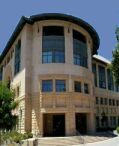Graphics:
Core Systems Software:
- SUIF Group (Professor
Lam)
The SUIF (Stanford University Intermediate Format) compiler,
developed by the Stanford Compiler Group, is a free infrastructure
designed to support collaborative research in optimizing and
parallelizing compilers.
- The Center for Reliable Computing
(Professor McCluskey)
The Center for Reliable Computing studies design and evaluation
of fault tolerant and gracefully degrading systems, validation
and verification of software, and efficient testing techniques.
VLSI and Architecture:
- The VLSI Systems and Design
Group is actively involved with the study of new VLSI architectures,
including multiprocessors and VLSI design automation.
- Smart Memories
(Horowitz, Dally, Hanrahan, Kozyrakis, Lam, Olukotun, Rosenblum)
The Stanford Smart Memories Project is a research effort to
design a single-chip computing element which provides configurable
hardware support for diverse computing models and maps efficiently
to future wire-limited VLSI technologies. The project involves
researchers in VLSI circuits, computer architecture, compilers,
operating systems, computer graphics, and computer networking.
- Hardware Verification
Group (Professor Dill)
The hardware verification group studies theory and application
of formal verification techniques to system designs including
hardware and protocols. Research is also done in asynchronous
circuit synthesis and verification.
- Hydra Project
(Professors Olukotun, Lam, Horowitz)
The Hydra project is designing a single-chip multiprocessor
for general purpose computing.
Computer Systems Networking:
- Mobile Net
(Professors Meng, Horowitz)
The Mobile Net project aims at the design of ultra low-power
mobile distributed networks that will provide robust, distributed,
variable-bandwidth, low-cost and versatile wireless communication
among a large number of mobile units.
- Multimedia Networking
Group (Professor Tobagi)
The Communications Networking group examines computer communications,
packet radio and satellite networks; local area networks, including
high speed fiber optics communications and integrated services;
VLSI implementation of network functions; performance evaluation
by mathematical modeling and computer simulation.
- Distributed
Systems Group (Professor Cheriton)
The Distributed Systems Group explores distributed systems
and parallel systems issues by designing new high-speed protocols,
building scalable shared memory multiprocessor hardware, and
implementing a new generation of distributed parallel operating
system, extending the early work based on the V Distributed
System. The work also includes exploration of techniques for
structuring demanding applications in this parallel, distributed
environment.
- High Performance Networking
Group (Professor McKeown)
The group works on architectures, analysis and algorithms
to increase the speed of networks. Most of the work focuses
on the design and architecture of high performance Internet
routers and packet switches. Topics include: Internet address
lookup algorithms, router architectures, packet buffer architectures,
and switch scheduling algorithms.
Human Computer Interaction:
- Interactivity Lab
(Professor Winograd)
The Interactivity lab supports a variety of projects with
the goal of developing new devices, techniques, and theories
that support the design of fluent interaction in a ubiquitous
computing environment.
- HCI Consortium
(Professor Winograd)
Human-computer interaction research at Stanford cuts across
variety ofdepartments at Stanford. The faculty from these departments
work in collaboration with CS faculty on a variety of projects.
Information management:
- Database Group
(Professors Garcia-Molina, Ullman, Widom, Wiederhold)
The Stanford Database Group studies information management
in a broad context, including information integration, data
mining, and data warehousing.
- Digital Library Project(Professors
Winograd, Koller, Garcia-Molina)
The Stanford Digital Libraries project is one of five university
participants in the Digital Library Initiative, started in 1994
and supported by the NSF, DARPA, and NASA. Our focus is on interoperability.
The design and analysis of geometric algorithms, digital printing
and document preparation, multiprocessor systems, multi-valued integrated
circuits, operating systems, performance measurement and modeling,
program development systems, and programming language design. |






